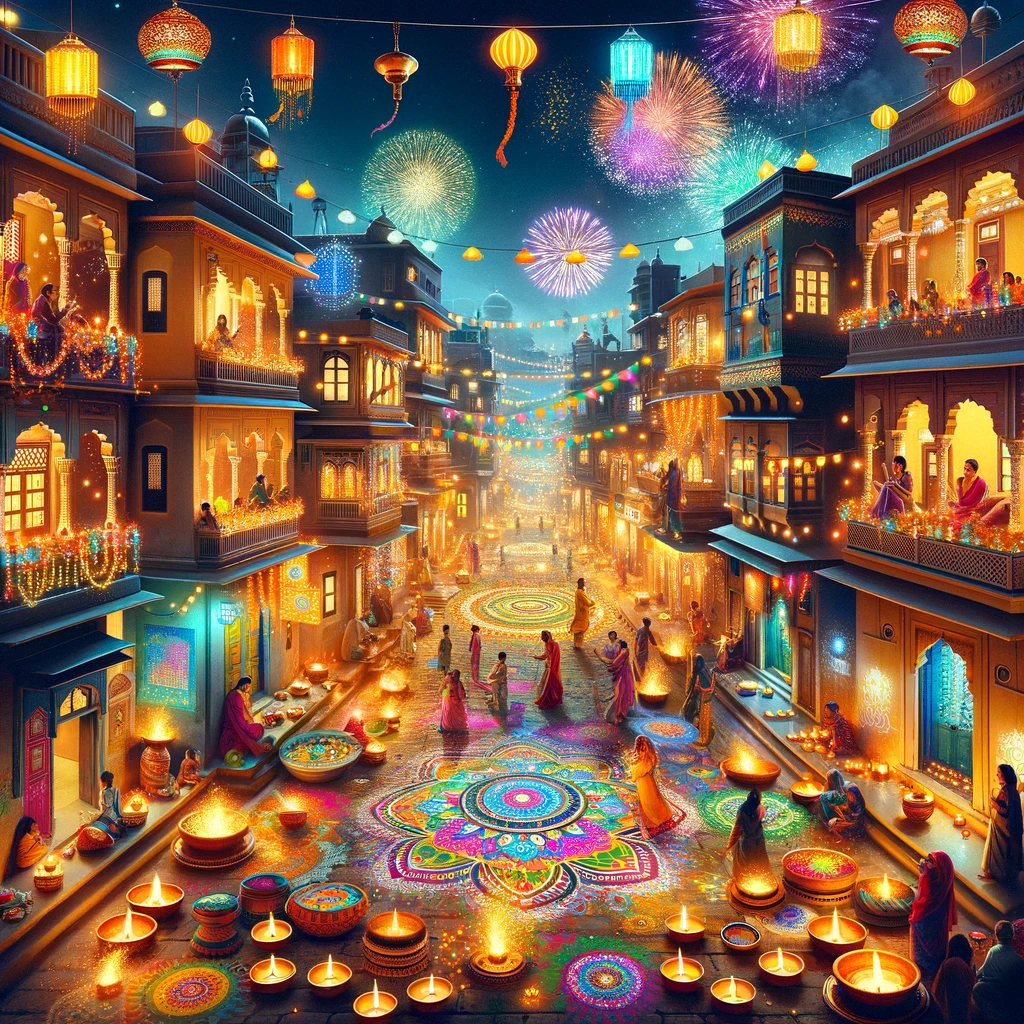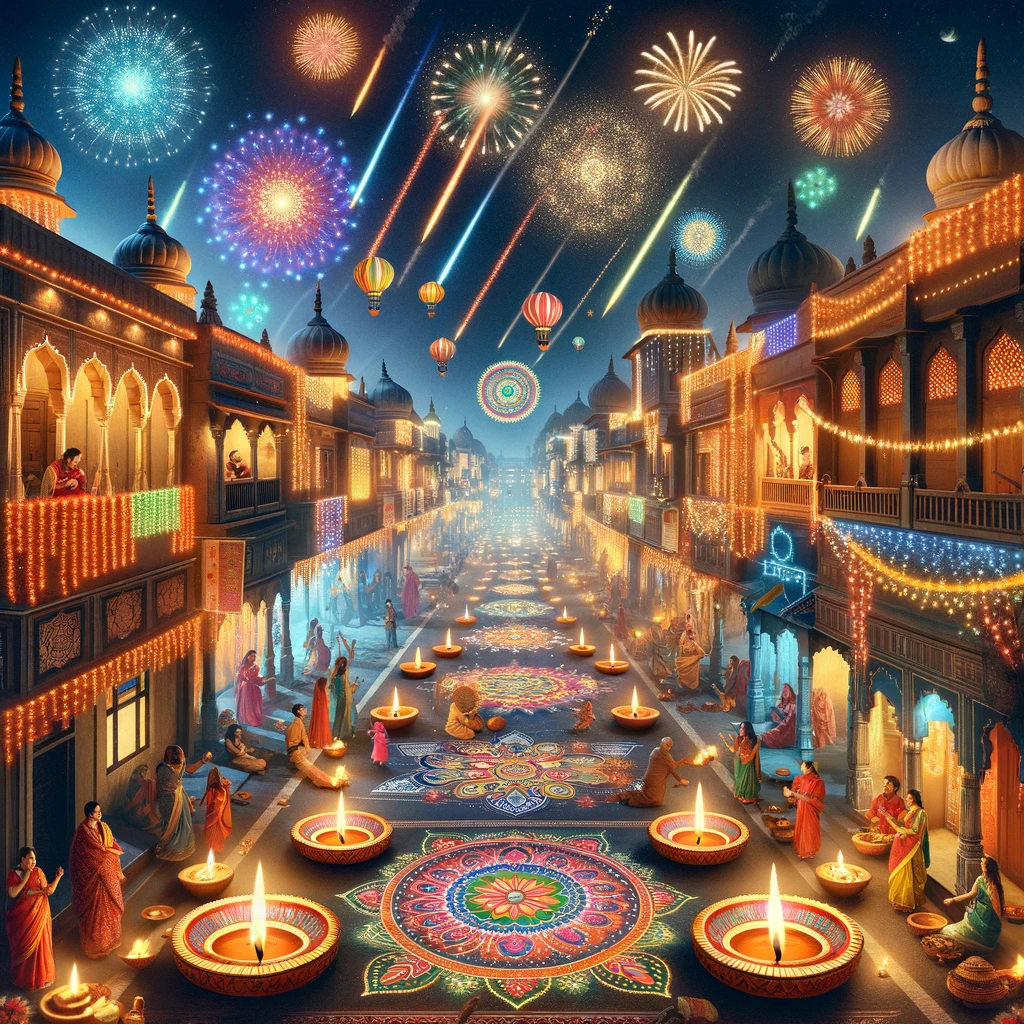Diwali, also known as Deepavali, is one of the most revered and celebrated festivals in India. Known as the Festival of Lights, it symbolizes the triumph of light over darkness and good over evil. This festival, with its rich history and cultural significance, not only brings joy and festivity to India but also to Indian communities across the globe.
The Historical Significance
The origins of Diwali are rooted in ancient Indian culture. Various legends and religious texts are associated with its celebration. One of the most popular stories is from the Hindu epic, the Ramayana. It marks the return of Lord Rama, along with his wife Sita and brother Lakshmana, to their kingdom of Ayodhya after 14 years in exile and a victory over the demon king Ravana. The people of Ayodhya lit rows (avali) of clay lamps (deepa) to welcome them, hence the name ‘Deepavali.’
Religious and Cultural Significance
Though predominantly a Hindu festival, Diwali is celebrated by followers of other Indian religions too, such as Jainism, Sikhism, and Buddhism, each with its own historical background and significance. For Jains, it marks the nirvana of Lord Mahavira, the last Tirthankara. In Sikhism, it commemorates the release of Guru Hargobind Ji from Mughal imprisonment.
Hinduism
For Hindus, Diwali is a five-day festival that begins on Dhanteras and ends on Bhai Dooj. Each day has its own significance:
- Dhanteras: It marks the beginning of the festival when people clean their houses and make decorations on the floor, such as rangoli. It is considered auspicious to buy gold and silver on this day.
- Naraka Chaturdasi: This day commemorates the defeat of the demon Narakasura by Lord Krishna. People light lamps and burst crackers.
- Diwali: The main day of the festival is dedicated to worshiping the goddess of wealth, Lakshmi. Families gather, perform puja, exchange gifts, and light up their homes with diyas and candles.
- Govardhan Puja: This day is celebrated as a tribute to Lord Krishna’s act of lifting the Govardhan hill to protect the villagers from Indra’s wrath.
- Bhai Dooj: The festival ends with this day, emphasizing the bond between brothers and sisters.
Jainism, Sikhism, and Buddhism
In Jainism, Diwali is observed to mark the attainment of moksha by Mahavira. Sikhs celebrate it as Bandi Chhor Divas, remembering the release of Guru Hargobind Ji. Some Buddhists in India, particularly the Newar Buddhists of Nepal, also celebrate Diwali, marking the day Emperor Ashoka embraced Buddhism.
The Festivities and Customs
Diwali is celebrated with great enthusiasm across India. Each region has its unique way of celebrating the festival, yet some common practices are observed nationwide.
Lighting and Decoration
The most significant aspect of Diwali is the lighting of oil lamps or candles, symbolizing the victory of light over darkness. Homes, offices, and streets are adorned with these lights, creating a magical and enchanting atmosphere. Rangoli, an art form where patterns are created on the floor using colored sand, rice, or flower petals, is another integral part of Diwali decorations.
Fireworks
Fireworks and firecrackers are a hallmark of Diwali celebrations. The night sky on Diwali is a spectacular display of lights and sounds, although in recent times, there has been a growing awareness and push towards a more environmentally friendly celebration.
Exchange of Gifts and Sweets
Exchanging gifts and sweets with friends, family, and neighbors is a cherished tradition. It’s a way of sharing happiness and strengthening bonds.
Special Foods and Feasts
Diwali is also a time for feasting. Various sweets and savory dishes are prepared and enjoyed. Sweets like ladoos, barfis, and jalebis are particularly popular.
The Global Impact of Diwali
Diwali’s allure is not limited to India alone. With the Indian diaspora spread across the world, the festival is celebrated with great fervor in countries like the United States, United Kingdom, Canada, Australia, and many others. It has become a part of the global cultural landscape, bringing with it its message of peace and joy.
Cultural Exchange
Diwali has become a means of cultural exchange, where people of different ethnicities come together to experience and participate in the festivities. It’s a reflection of India’s age-old ethos of “Vasudhaiva Kutumbakam” (the world is one family).
Economic Impact
The festival season is a boon for businesses, both in India and abroad. From traditional attire to sweets and fireworks, the demand for festive goods creates a significant surge in economic activity.
Challenges and the Way Forward
While Diwali is a time of celebration, it also brings with it certain challenges. The environmental impact of firecrackers has led to increased pollution levels in many cities. The festival also raises concerns regarding noise pollution and safety hazards.
Embracing Eco-Friendly Practices
There is a growing consciousness towards celebrating an eco-friendly Diwali. This includes using biodegradable materials for decorations, minimizing the use of firecrackers, and opting for eco-friendly gifts.
Community Involvement
Community-led initiatives for a safe and green Diwali are gaining momentum. These involve awareness campaigns, organizing community feasts, and encouraging the use of eco-friendly lights.

The Spiritual Dimension of Diwali
Beyond the festivities and joyous celebrations, Diwali holds a deep spiritual significance. It’s a time for introspection, self-improvement, and kindling the inner light. In the Hindu philosophy, the light of the diyas is symbolic of knowledge and consciousness. As the lights dispel the darkness that envelops the world, individuals are encouraged to let go of ignorance and embrace wisdom and righteousness.
Inner Reflection and Renewal
Diwali is an opportunity for individuals to reflect on their lives, reassess their actions, and cleanse their souls. It’s a time to seek forgiveness for past mistakes and make resolutions for the future. This spiritual cleansing is as important as the external cleanliness and decorations.
The Concept of Victory of Good over Evil
The central theme of Diwali, the victory of good over evil, extends beyond the historical and mythological narratives. It resonates with the universal human journey towards enlightenment and the continuous struggle against inner demons like greed, arrogance, and jealousy.
Unity in Diversity
The diverse ways in which Diwali is celebrated across various cultures and religions in India is a testament to the country’s pluralistic society. It underscores the universal appeal of the festival and its ability to unite people from different walks of life.
The Social Impact of Diwali
Diwali is not just a personal or familial event but also a community celebration that has significant social implications.
Strengthening Community Ties
Diwali fosters a sense of community and belonging. Community events, cultural programs, and public celebrations bring people together, bridging gaps and nurturing communal harmony.
Charitable Activities
Diwali is also a time for philanthropy and giving back to society. Many people engage in charitable activities, donate to the needy, and support humanitarian causes. This aspect of the festival highlights the importance of compassion and generosity in human values.
The Role of Diwali in Modern Society
In the fast-paced modern world, Diwali offers a respite and an opportunity to reconnect with one’s roots and culture. It’s a reminder of the importance of traditions and the need to preserve them for future generations.
The Artistic and Cultural Expressions of Diwali
Diwali is a canvas for artistic expression and cultural richness. From the intricate designs of rangoli to the melodious tunes of devotional songs, the festival is a celebration of art and culture.
Music and Dance
Traditional and contemporary music and dance performances are integral to Diwali celebrations. They not only provide entertainment but also keep cultural traditions alive.
Handicrafts and Artisanal Crafts
The demand for traditional handicrafts, including diyas, pottery, and ethnic wear, provides a significant boost to local artisans and craftspeople, helping preserve ancient crafts.
Influence on Literature and Cinema
The themes of Diwali have influenced Indian literature and cinema, with numerous works depicting the essence of the festival and its cultural milieu.
Diwali in the Digital Age
The advent of digital technology has transformed the way Diwali is celebrated. Social media and digital platforms play a pivotal role in connecting people across the globe during the festival.
Virtual Celebrations
For those away from home, technology offers a way to connect with family and participate in celebrations virtually. Online platforms host live streams of Diwali events, enabling participation from anywhere in the world.
E-commerce and Online Shopping
The surge in online shopping has revolutionized the way people prepare for Diwali. From decorations to gifts, everything is now available at the click of a button.
Digital Awareness and Campaigns
Digital platforms are also used for raising awareness about eco-friendly celebrations and promoting safer, more inclusive festivities.
Conclusion
Diwali, the Festival of Lights, is a multifaceted celebration that encompasses not just the lighting of lamps but also the illumination of hearts and minds. It’s a time for joy, reflection, and togetherness. As the world embraces Diwali in its myriad forms, the festival continues to be a beacon of hope, harmony, and renewal. In a world often divided by differences, Diwali shines as a symbol of unity, reminding us that despite our diverse paths, we are all part of a single, beautiful tapestry of humanity, glowing brighter together in the light of this timeless festival.
